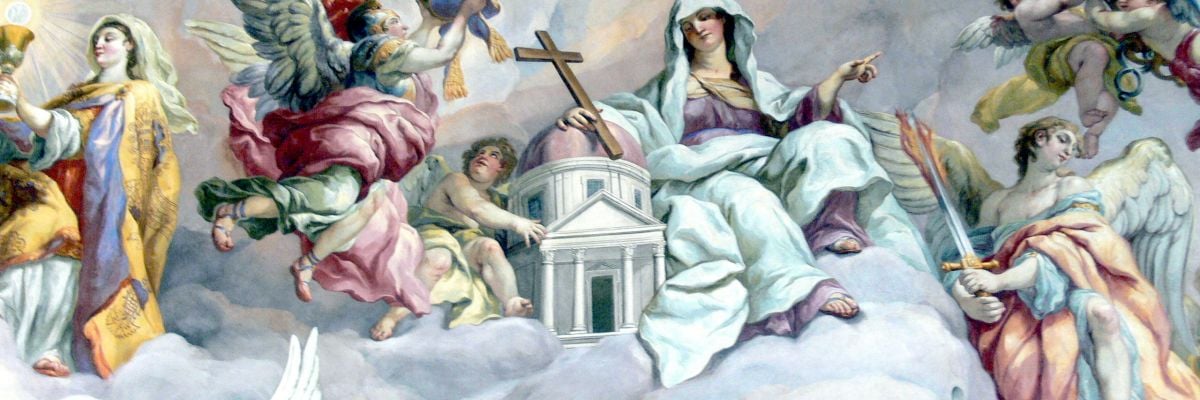
Over several posts, I have responded to various Protestant objections to praying to saints. “How can a mere man respond to multiple prayers at the same time?” “Prayer to saints is necromancy!” Or, perhaps the most famous, “If Jesus Christ is revealed in I Tim. 2:5 to be the ‘one mediator between God and men’ how can we have thousands of ‘mediators’ in the saints?”
In this post, we’ll consider the objection of those who believe praying to saints is tantamount to adoring them as God. In his book, Answers to Catholic Claims – A Discussion of Biblical Authority, James White writes: “Prayer, it is asserted [in Scripture], is an act of worship, and we are to worship God alone.” If that is so, we Catholics need to knock it off, so what gives?
The Catholic Response
When Catholics say we are praying to God and praying to saints we are talking about qualitatively different things as different as a monkey is to a man. The Protestant generally only has one species in mind when he thinks of prayer—prayer to God that necessarily includes adoration. But one need only pick up a dictionary to discover there are in truth different definitions and therefore different usages of the same word in English.
Prayer:
The act or practice of praying.
- An earnest request; entreaty; supplication
- (a) humble entreaty addressed to God, to a god, etc.: (b) a request made to God, etc.; as, her prayer for his safe return; (c) any set formula for praying, as to God.
Prayer is not, by definition, necessarily equated with the adoration that is due God alone. Prayer can certainly involve an act of adoration when it is directed to God, but the term does not necessarily denote adoration. It can simply mean “an entreaty.”
In Old English we did not have so much of a difficulty here. One could say to another, “Pray tell…” or, “I pray thee my lord…” In fact, the King James Bible gives us many examples of the term “prayer” being used analogous to the way Catholics use it when we “pray” to saints. With a touch of Old English, when Bathsheba makes a request of King Solomon in I Kings 2:20, the KJV has her say: “I pray thee, say me not nay.” There was never a question here of whether the King James Bible was presenting Bathsheba as adoring her son as God, or praying to him in a way that is forbidden. It was not. Nor are Catholics when we pray to saints. We certainly honor them when we pray to them. In other words, we do not talk to them like we talk to the boys at the local bar and grill. We show great respect and reverence for them. But we do not adore them as we adore God alone. And we also petition them for their prayers because Scripture makes very clear that we need each other as members of the body of Christ (see I Cor. 12:12-27).
Defining the Difference
The Catholic Church has gone to great lengths to define the essential difference between prayer to God and prayer to saints. You may have noticed that I have been using the English word “adoration” to refer to that honor we give to God alone. I do so because in Catholic tradition when using the English language, “worship” has often been used of honor given to the saints. “Adoration” is the term that has come to be used for God alone. “Worship” and “adoration” are English translations of terms the Church uses in her definitve teaching to define the difference between the honor that is given God and the honor proffered to the saints.
The Second Ecumenical Council of Nicaea, in AD 787, referred to this “adoration” given to God alone as latreia (Greek) or latria (Latin). This comes from a Greek root that we find in Scripture in multiple places and in different words. In Gal. 5:20, for example, we find St. Paul condemning “idolatry”—idolatreia. This term literally means “idol-adoration.” Another example is found in Hebrews 9:6 where the inspired author refers to the ministry of priests in the Old Testament as offering their “ritual duties” to God (Gr.—latreias).
The Council Fathers used latria in this sense of “adoration” that ought only to be given to God. When the Council considered praying to saints, the fathers taught that this prayer should include the honor that is owed them in justice, but never adoration. They chose to use douleia (Greek)or dulia (Latin) in order to make this distinction clear. Hence, we have an entirely different kind of prayer offered to the saints than to God. In the Council’s Doctrinal Definition, the fathers declared:
The more frequently they are seen in representational art, the more are those who see them drawn to remember and long for those who serve as models, and to pay these images the tribute of salutation and respectful veneration. Certainly this is not the full adoration {latria} in accordance with our faith, which is properly paid only to the divine nature, but it resembles that given to the figure of the honored and life-giving cross, and also to the holy books of the gospels and to other sacred cult objects. Further, people are drawn to honor these images with the offering of incense and lights, as was piously established by ancient custom. Indeed, the honor paid to an image traverses it, reaching the model, and he who venerates the image, venerates the person represented in that image.
Is prayer necessarily an act of worship? No, it is not. For those who are still inclined to disagree, pray tell us why at http://forums.catholic.com/.



